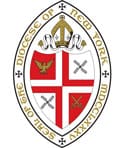Diocesan Archives
The Archives contains over 2,000 boxes of historical records, including some records for all of our congregations and all of the original records of the Cathedral Church of St. John the Divine as well. Our Cathedral collection alone numbers hundreds of boxes that include original building files, information on the fabric including the stained glass, art and sculpture, and special events, as well as an extensive collection of photographs and audio tapes. Most recently we have acquired the papers of the Very Rev. James Parks Morton as well.
Our Parish Records Series includes records on over 350 churches, chapels or missions now or once located within the present boundaries of this diocese. Several parishes, like St. Ann’s Church for the Deaf for instance, have chosen to deposit all of their historical records here. Sacramental records for about 80 congregations, including the cathedral, can also be found here, as well as the personal papers of our bishops and all manner of diocesan business files: meeting minutes, legal documents, deeds, some blueprints, and trust fund materials as well. The diocesan archivist also acts as registrar with respect to keeping the historical record of Episcopal Acts, like visitation-confirmation rosters, the issuance of lay licenses, etc.
Genealogy: The Episcopal Church does not have a central index or repository for all of its sacramental records, nor are there any major indexes of such records. Records of baptism, marriage, and burial may be found only in the sacramental register of the church in which the service was performed. Hence you would need to identify what specific church your ancestors attended and then try to track down the whereabouts of the sacramental records for that specific church. One helpful hint: knowing the name of the minister who married or baptized an ancestor can easily lead to the identity of the church in question as there are national clergy directories available. One might also determine the address at which the family lived; knowing that, we might be able to determine which Episcopal Churches were nearest to that address.
The New York Diocesan Archives does have the sacramental registers for a number of churches that have closed over the past century; active churches maintain their own registers, although in a several instances the archives acts as records custodian for churches with special storage needs. Sadly there are cases where such records have been destroyed by fire, flood etc. There are also rare occasions when those records were deposited in the collections of local libraries or historical societies years ago, often before the diocese had its own archives. I should also say that if a merger of congregations had taken place, records for both merged congregations are likely kept in the ‘new’ parish. The Episcopal Diocese of New York is composed of the boroughs of Manhattan, Staten Island, the Bronx, and seven northern counties: Westchester, Putnam, Dutchess, Rockland, Sullivan, Orange and Ulster.
Brooklyn, Queens and Long Island are all part of the Diocese of Long Island. Long Island has their own archives as well. There are also separate diocese of Albany, Rochester, Central New York and Western New York. For information from those areas you will need to contact them.
Located in the basement of Diocesan House on the grounds of the Cathedral Church of St. John the Divine, 1047 Amsterdam Avenue, hours are Monday through Thursday from 7:00 am to 4:30 pm. Visits by appoinment only.
Mr. Wayne Kempton, Archivist & Historiographer
Queries are welcome touching on any area of Episcopal Church history.
212-316-7419 archives@dioceseny.org
Diocesan Archivist and Historiographer
Mr. Wayne Kempton
Archivist & Historiographer
Office: 212-316-7419
Fax: 212-316-7405
archives@dioceseny.org



